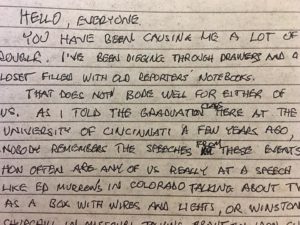
Hello, everyone.
You have been causing me a lot of trouble. I’ve been digging through drawers and a closet filled with old reporters’ notebooks.
That does not bode well for either of us. As I told the graduation class here at the University of Cincinnati a few years ago, nobody remembers the speeches from these events. How often are any of us really at a speech like Ed Murrow’s in Colorado talking about TV as “a box with wires and lights,” or Winston Churchill’s in Missouri talking about an “iron curtain” descending over Eastern Europe?
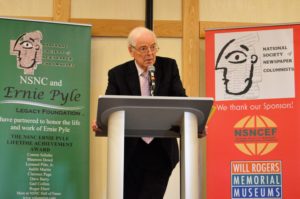
Nick Clooney Addresses NSNC conference attendees in Cincinnati, OH.
In my own case I remember only a commencement address at Millersburg Military Academy just 80 miles from us. It was a hot May day 40 years ago. We were seated on metal chairs outside, and the speaker was late. The commandant told the 200 of us assembled that our distinguished guest would not arrive, but that the much-respected local physician had agreed to fill in.
It was clearly a moment he had waited for all his life.
While we dehydrated in the sun, he spoke to us for 35 minutes about the benefits of roughage in the diet.
Clearly this will not be as memorable. But neither will it be as long.
***
I have not given one of these talks in two years.
As I told those who invited me, I don’t think I have anything to tell you anymore, if I ever did.
I certainly thought I did. I used to spout off every two weeks or so on all manner of topics. I was confident and ridiculously sure of myself. I was also full of baloney.
So why did I show up? Because I owe you something. I’ll get to that in a moment.
First, let me say that both the kind and well-intentioned organizers and the kind and well-intentioned me forgot something:
I am now 84 years old. Anything that comes out of my mouth I will now take very seriously. After all, it could well be something of a personal valedictory.
For the last month I have spent entirely too much time staring at a wall and wondering what to say to you.
When I began to question what was going on in the governing system of our country, I would go back to the two wisest men I ever knew, who dealt with that system hands-on for most of their adult lives:
John Sherman Cooper, Republican of Kentucky, and Lee Hamilton, Democrat of Indiana. For extensive patches of my life, I would speak to these two men nearly every week.
I asked them both, when would we know when and if the system was running seriously off the rails? Both men were, at heart, optimists, but they were certainly realists. I wrote down fragments of what they said and pulled them out of a drawer two weeks ago.
Senator John Sherman Cooper told me at an airport in Lexington, “America is constructed to absorb and deal with the small collection of nuts that always congregate at the far ends, left and right, of the political system. If you see a loss of resilience, a sclerosis of the public conversation, look out. The bravest and most endangered public servant is the moderate. If he disappears, America is heading for history’s scrap heap.”
Lee Hamilton told me at a political barbecue 10 miles from here, “The American Way is based on a contract of trust. If every driver stops obeying the stop sign or believing the other guy will, there is chaos and nobody gets anywhere. The same way with laws and rules. They have to be fair and we all have to believe they are fair. Those who enforce them have to be constantly monitored. And the monitors themselves held to account. We have failed as a nation every time our rules governing fairness are ignored or subverted or ridiculed. Democracy is a contract based on objective truth, or it is a fraud.”
***
Shouldn’t there be something of summation in these remarks? Shouldn’t I be able to tell you what, for me, it was all about?
I cranked out three columns a week for eighteen years. I anchored thousands of newscasts on radio and television even before the term “anchor” was coined to describe what I was doing.
In recent years when colleagues warned of the dangers of “artificial intelligence,” I told them I had been an expert in “artificial intelligence” for half a century.
We called it “television.”
Something else was troubling me. I haven’t done any of these talks in a couple of years, mostly because I had begun to question many of my long-held news verities. The rock-solid dogma of the Great American Experiment began to tremble under my feet.
Or was it just that I was now certifiably old and had finally learned to spell curmudgeon?
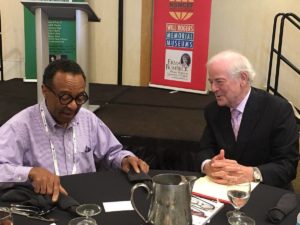
Clarence Page and Nick Clooney, Photo by Suzette Martinez Standring
I looked around for something even remotely recognizable in the American public arena where I have spent my entire adult life. And guess what I found?
YOU.
And what was your weapon of choice?
Newspapers, for God’s sake.
Thomas Paine would recognize your battleground. And your battle. And your weapon.
Columnists, political cartoonists, and editorialists are at the barricades and, because they are, at least one ancient warrior – this one – retains a glimmer of hope.
That’s why I am here today. For whatever it is worth, I want to thank you.
What you are doing is not easy. In fact, this iteration of the recurring cultural revolutions in our history is, I submit, the most challenging of my lifetime, because the communication rules have been shattered, accelerated, distorted.
I’m going to spend the next few minutes telling you what it looked like to me when I started in radio. I was 17 years old and McCarthyism ruled politics.
The next year, in 1952, I even had a brush with the principal character in the fall election, Dwight David Eisenhower. I yelled a question at him after his campaign speech at Dupont Circle in Wilmington, Delaware. I was working as an announcer at WDEL Radio and my major duty was presenting the 11 p.m. news. For that reason, I was one of our staff to cover the speech that bright October afternoon. There was a brief pause before Ike exited the stage, so I called out a question that my colleagues considered impertinent. I doubt the candidate even heard me, but he stalked off the stage, and veteran reporters thought I had irritated the touchy General Eisenhower and botched their chance at an impromptu news conference.
Unfortunately, at age 18, I learned the wrong lesson and it was some time before I got back to asking impertinent questions.
***
Anyway, eventually McCarthy and McCarthyism both died, and the nation clanked and cranked its way through war in Korea and civil-rights battles with its essential optimism intact.
Surviving a revolution of the right, it confronted a revolution on the left following nearly a decade of assassinations and a year, 1968, that I always insisted the USA suffered its first full-fledged nervous breakdown, made manifest by a witches’ brew of war and racism.
We argued over whether diversity was our salvation or our Achilles heel.
Some believed that the only thing holding us together was an aging U.P. print reporter turned broadcast journalist for whom the term “anchorman” was coined – Walter Cronkite.
Which gives me a chance to haul out one of my anecdotes and, incidentally, to drop a famous name.
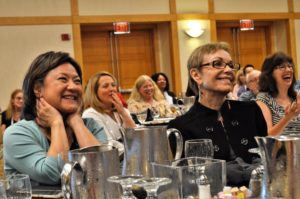
NSNC Executive Director Suzette Martinez Standring and Nina Clooney Listen to Nick Clooney speak.
As it happens, Walter Cronkite and his wife, Betsy, and my wife, Nina, and I, late in all of our lives, became very good friends. We had met, briefly, at the Republican National Convention in 1976, but it was years later we spent a long evening together at one of those chicken-and-peas benefit dinners. The conversation got fairly animated and before the night was over, by the strange alchemy through which these things sometime happen, we were friends. Just phone calls at first, then meetings for drinks, then family dinners, a couple of vacations – we did a few speeches together.
Don’t get me wrong. I was always completely aware of the chasm that existed between our stations in life, and if I sometimes forgot, there was always my wife, Nina, to remind me.
Once, we were having lunch at a favorite spot of both families, Patsy’s Italian restaurant in midtown New York. The meal went on entirely too long and Walter and I indulged our shared enthusiasm for Maker’s Mark too much. After three hours, Nina and I were walking back to our hotel and I was waxing eloquently about our conversation, still a foot or two above the sidewalk…
“Wasn’t it great, Nina, two old guys, telling each other news stories?”
“Yep,” said Nina. “You told him about the Newport, Kentucky, firefighters’ strike, and he told you about Anwar Sadat!”
I hit the ground with a thud.
It was rare that we had serious conversations about what we did for a living – we were having too much fun for that – but when we did, we agreed that if Americans had a unique characteristic, if there was anything to this hullabaloo about “American exceptionalism,” it was an unquenchable optimism. It had survived, in our lifetime, the collapse of our economic system, the Great Depression that we started and left the world gasping and ancient civilizations everywhere falling for “isms” left and right – fascism, communism, through 30 percent unemployment, and that was breadwinners. Out of work.
We had barely begun to crawl out of that disaster when we were plunged into a brutal world war for which we were completely unprepared. Many now forget it was a war we could have lost. For those of us living through it, there was nothing inevitable about final victory.
Did that stubborn American optimism have a role in all that? That uneasy marriage of the concepts of a democracy pasted onto a republic seemed to make our nation more resilient, perhaps more open to change.
One night at the close of a birthday party, we decided that maybe Jefferson had put his finger on it, as he so often did.
He said, “Nothing is so nearly infallible as the deliberate will of a free people.”
Every word of that was important. Nearly infallible. Deliberate will. Free people.
We decided we would settle on that for a mantra, until something better came along.
Nothing did.
Instead, Walter and the whole generation that held our journalistic feet to the fire for years went and died on us.
The Berlin Wall came down and in the years that followed, it seemed to me we lost our collective grip on what we were doing for a living, in every medium and in every location.
***
Looking back, the Crash, the Depression, the Second World War, the Atomic Age and the Cold War standoff, it seemed to me, had given birth to a couple of generations of the best, most professional news coverage we ever had.
We got better at news because we had to, at every level. If we didn’t have reporters taking as disinterested a look as possible at every one of our institutions, we were toast.
Around the world, free speech and an unfettered exchange of accurate information died, and so did many of the most famous nations in human history.
Flawed as our news was, it evolved into the best the world had ever seen, and along the way also became the least-recognized key to our own national success.
Why did that happen? I submit the motivation was fear. If we didn’t tip-toe carefully on the razor’s edge of all those mortal dangers, including the granddaddy of them all – a nuclear holocaust – a black hole was our destiny.
Then the Wall came down. There would not be a nuclear face-off between the two superpowers after all.
Those in news were slow to take note, but when we finally understood, or thought we understood, that we were not as necessary as we had been, we began to play.
We got increasingly good at irrelevance. It was a hoot to chase celebrities. To look through keyholes and up skirts, and call it news. And, besides, there was money to be made at it.
Stories that just a few months earlier would have been dismissed as “kickers” or ignored entirely, made it to the news hole, sometimes as the lead.
Very slowly, at first, we began edging toward deeper irrelevance. Commerce was at the forefront of this trend.
In broadcast news, gone were the days when news was a “loss leader” in the program day. News was, in those important years, supported by management at both the national and local level, as a public service. It always lost money.
That changed.
When the Wall came down, news, the vital exchange of information, softened. There was money everywhere, lots of it, in news.
It turned out, as we all know, to be a mixed blessing.
I submit that, eventually, all that money turned news into entertainment. We became enablers in the coarsening of our society.
While this was going on, I, like you, was still doing my job, day by day. One day, Eric Sevareid came here for a speech. He had become a back-burner news star. Too serious. No pizzazz. When he was finished, we had a cup of coffee. I was, by that time, a news director. He asked me, “Do you ever think about any of this, all of this?”
I told him the truth. No, I did not. I just got the newscast on the air.
His indictment hung in the air.
***
Occasionally, like you, I was asked to speak at schools, service clubs, churches, even commencement addresses.
By their questions, those in the audience always taught me more than I taught them. Now I believe my only value was as a cautionary tale. Don’t fall in love with your core knowledge. Things change. Even knowledge changes, I told them.
Take a look at what I knew in 1952 when I was a high school graduate.
I knew, because I had been taught, that at the consumption rate of 1950, we would burn up our recoverable reserves of anthracite by 2000 and have to import coal.
I knew that, come summer, one person of my acquaintance would contract polio and die, or be confined to an iron lung or a wheelchair.
I knew that our population at the 1950 Census birth rate would reach 400,000,000 by 2000. But that I would not live to see it because my life expectancy as a male was 63.
I knew that our cars and planes would soon run on the new atomic power.
I knew that eventually we would have to go to war with the Soviet Union.
I knew that black Americans were perfectly content on their own side of town and in their own schools because, though separate, they were equal because the Supreme Court said so.
I knew that a Catholic or a black or a woman would never be elected president.
I knew that the only things women truly wanted were a husband, a station wagon, and 4.3 children.
I knew that if I ate meat on Friday, I would go to hell.
I knew a lot.
Much later, I came to understand what my grandfather, a small-town politician, meant when he quoted his favorite columnist with these words: “Nicholas, it ain’t what you don’t know that hurts you. It’s what you know that ain’t so.”
That ought to be on every masthead and lead every newscast – especially now. Today.
Still, at the close of most of those speeches, I would end on an optimistic note because of something I thought I knew. I thought I knew it because good people had taught me and taught every American of my acquaintance. And most of us believed it.
I knew I was responsible for my own actions.
I knew ours was a nation of laws.
I knew I was supposed to take care of my family and that, ultimately, everybody was in my family.
That I was to be fair.
That I was to tell the truth, especially when it was hard to do.
That I was to keep my word, especially when it was uncomfortable to do so.
That I was to help people with less power than I, challenge those with more power and be suspicious of all power, especially any I got myself.
***
What happened?
It was not a political campaign in 2016 that changed us. Or a man. (Click here Tweet this quote).
What did Pogo say? “We have met the enemy and he is us.”
What baggage had we been carrying out into the world? What small bigotries and tiny prejudices lay dormant in our hearts for years, ready to spring to life when times got tough, as they always do? When did we start to listen to those who told us we were victims? When did we turn into people we would, a few years earlier, not even have recognized? Or allowed into our houses?
When did we become a society who would publicly mock a disabled person? Cheer the public demeaning of a certifiable American hero? Supinely accept the distortion of, or even denial of, provable facts?
Are these the symptoms historians try to ferret out to learn if a great nation has lurched into decline?
Of course, I don’t know. What I do know, is you have no hand in it. You have been blowing the whistle.
I know something else, too. It is something most of you have already suspected.
Here’s the bad news I can tell you from the heights of 84 years: Most of the lovely dreams you still harbor won’t come true. Most of the goals toward which you strive will remain unrealized.
The good news is that it doesn’t matter at all.
Most of those goals and dreams were ephemeral anyway. Many of them pre-supposed some Oz-like destination or accomplishment that was bound to go up in a puff of smoke anyway.
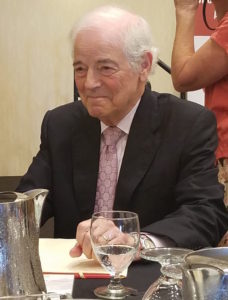
Nick Clooney, photo by Suzette Martinez Standring
It was always the journey that counted. Every moment of it. Every mile of it.
And if as your story, like mine now, nears its end and your spouse’s face still has traces of affection and respect and your kids are still taking your calls, count yourself a success.
I think that’s all I had to say to you.
Except: Eat plenty of roughage.
And thanks.
-30-
***
Are you a columnist? Blogger? Opinion writer? Consider becoming a member of the NSNC today. Learn more here.


2 comments for “Nick Clooney: Things I Thought I Knew, and Other Reflections”